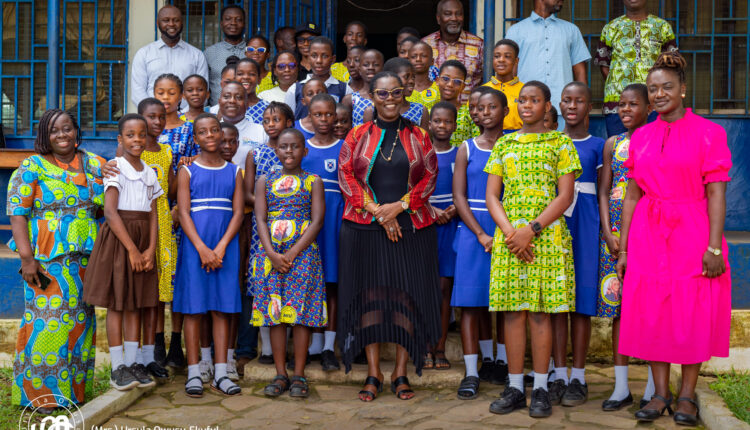The Minister for Communications and Digitalisation (MoCD), Mrs . Ursula Owusu Ekuful (MP) over the weekend paid a working visit to the Girls-In-ICT training centres in the Eastern Region to interact with the girls and encourage them to build their abilities in digital skills and STEM education as well as choose careers in the ICT Industry.
The centres visited included: Aburi Girls Senior High School (SHS), Mampong Presbyterian Senior High School (SHS), Koforidua Regional Library, Koforidua Ghana Secondary, e-Transform Project, Aburi Presbyterian Secondary Technical and Koforidua SDA SHS.
Excited over the impact of the training so far, Mrs. Owusu-Ekuful, said, Ghana has to demystify Information and Communication Technologies (ICT) and Digital Technology as well as allow women and girls know that their jobs are not only in the Arts.
She said “We have to demystify and introduce more girls to ICT/Digital Technology. We have to let women know that their jobs are not only in the Arts, but even with the Arts, they need some form of digital skills to be able to succeed”.
According to her, the world is evolving and the country could only develop when critical care is given to the young girls and platforms created for them to acquire digital skills.
“We seem to behave as if all things technical, mechanical, digital, engineering, science, mathematics, are a male thing so women cannot excel in it”.
She stressed that such thoughts have contributed to the huge gap between men and women in ICT in Ghana.
“Thankfully, it is changing. About 10 or 11 years ago, the International Telecommunications Union (ITU) decided that to make a difference and expose more girls to the wonders of ICT, we have to be deliberate and focused.
The JHS students wowed the Minister after they took terms to walk her through some codes, scribes, games among others they had developed.
The Minister who could not hide her joy also told Journalists that plans are underway to ensure that JHS and SHS have ICT centres where the students can access and acquire knowledge.
She also disclosed that measures are also being put in place to ensure that every JHS and SHS students has his or her own laptop.
They gave the assurance that they will make good use of what they had learned and also educate their colleagues.
Introduction
The Girls in ICT (GIICT) programme was introduced in 2012 by the International Telecommunications Union to create a global environment that empowers and encourages girls and young women to consider studies and careers in the growing field of ICT.
Ghana has since then adopted the initiative and observed it on a regional basis, having already celebrated it in the Greater Accra, Ashanti, Northern, Volta, Western, Central and Oti regions.
Inception
Since its introduction, over 500,000 girls and women worldwide have benefitted from this initiative.
The training in coding has given the girls the opportunity to explore the world of technology through the creation of websites, computer games, interactive arts, mobile apps and animation stories, using various programming languages.
As part of strategies to ensure that Ghana achieves the Sustainable Development Goal (SDG) 5 and Ghana’s ICT for Accelerated Development policy (ICT4AD) on bridging the gender digital divide, the Ministry, through its agencies –the Ghana Investment Fund for Electronic Communications (GIFEC), National Communications Authority (NCA) and the Kofi Annan ICT Centre of Excellence, has expanded the reach of the GIICT event.
Outline
As part of the training programme, the girls are introduced to scratch and basic structures of programming applications, after which they participate in a competition.
This competition is expected to test the depth of knowledge and ICT skills acquired during the training period, including website design, development of games, coding and simple ICT applications.
Interestingly, over 60 per cent of the girls trained had no prior knowledge or experience in the use of computers.
This, therefore, buttresses the determination by the sector ministry to expand the programme to reach more girls with adequate funding and resources from benevolent individuals and organisations.
Since its inception, the programme has been funded entirely by the MoCD, NCA and GIFEC, with some support from network operators and the American Tower Corporation (ATC).
This was, however, not enough to scale up the programme.


Comments are closed.